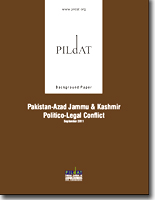The Background Paper on Pakistan-Azad Jammu & Kashmir Politico-Legal Conflict has been commissioned by PILDAT to assist and support an informed dialogue on the legal and political conflict between the State of Pakistan and AJ&K. This peer-reviewed paper is authored by Mr. Muhammad Feyyaz, who holds a Masters degree in War Studies from Quaid-e-Azam University, Islamabad and M.Phil. in Peace & Conflict Studies from the Faculty of Contemporary Studies, National Defence University, Islamabad. The paper has been prepared as a background for a conflict resolution simulation exercise for Members of the Legislative Assembly of Azad Jammu & Kashmir. Situated in upper reaches of Indian subcontinent and the Pakistani side of the Line of Control (LOC), Azad Jammu and Kashmir (AJ&K) is a unique politico-legal territorial entity of unresolved status which unlike IAK, has not been formally annexed by the state of Pakistan. The relationship between AJ&K and Pakistan is twofold: in 1947, the Federal Government of Pakistan struck a deal with Muzaffarabad, commonly known as the Karachi Agreement. Additionally, the AJ&K Constitution of 1974 gives Islamabad significant legal authority in the affairs of AJ&K but only through the Kashmir Council. The AJ&K Constitution also restricts the AJ&K Assembly and the Kashmir Council from making any laws regarding the following areas, which fall under the purview of the Federal Government of Pakistan. In March 1949, Pakistan created the Ministry of Kashmir Affairs and Northern Areas (MKANA now known as Kashmir Affairs and Gilgit-Baltistan), which has been liaising between the Azad Kashmir and Pakistan governments, although local Kashmir authorities have always been critical of its role. The paper is an analytical discourse which reviews the issue from multiple perspectives but as such is non-prescriptive in nature.







